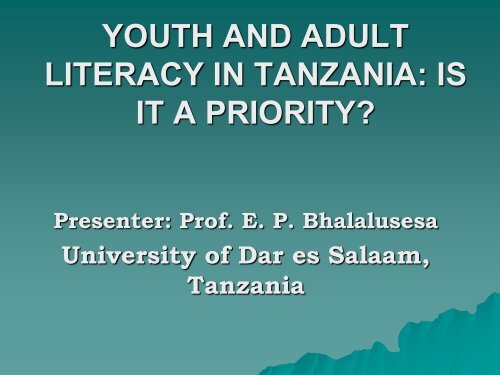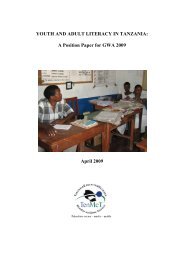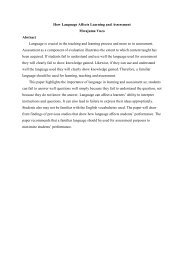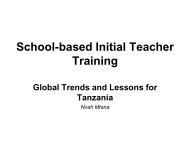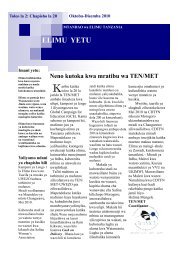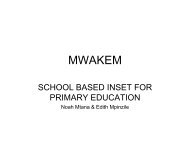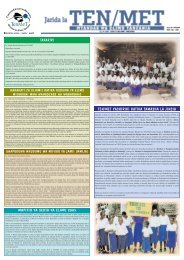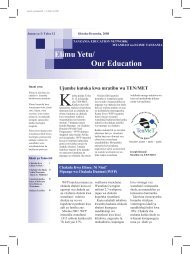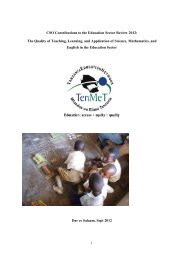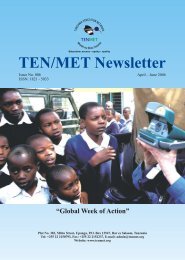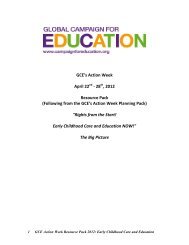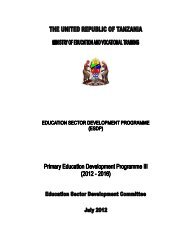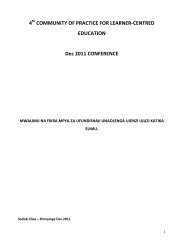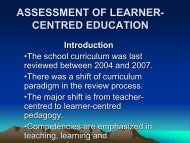Is it a Priority?Prof. E. P. Bhalalusesa University of Dar
Is it a Priority?Prof. E. P. Bhalalusesa University of Dar
Is it a Priority?Prof. E. P. Bhalalusesa University of Dar
Create successful ePaper yourself
Turn your PDF publications into a flip-book with our unique Google optimized e-Paper software.
YOUTH AND ADULT<br />
LITERACY IN TANZANIA: IS<br />
IT A PRIORITY?<br />
Presenter: <strong>Pr<strong>of</strong></strong>. E. P. <strong>Bhalalusesa</strong><br />
Univers<strong>it</strong>y <strong>of</strong> <strong>Dar</strong> es Salaam,<br />
Tanzania
Outline <strong>of</strong> the presentation<br />
‣Defin<strong>it</strong>ion <strong>of</strong> key terms: l<strong>it</strong>eracy,<br />
youth, and adult<br />
‣The current status <strong>of</strong> l<strong>it</strong>eracy worldwide<br />
‣The status in Tanzania: a prior<strong>it</strong>y or<br />
not a prior<strong>it</strong>y and why?<br />
‣Conclusion and recommendations
Defin<strong>it</strong>ions: L<strong>it</strong>eracy<br />
‣No standard defin<strong>it</strong>ion: There is no<br />
l<strong>it</strong>eracy acceptable all the time, for all<br />
people, and for all places.<br />
‣Most wr<strong>it</strong>ers on the subject tend to<br />
talk <strong>of</strong> l<strong>it</strong>eracies rather than one state<br />
<strong>of</strong> being l<strong>it</strong>erate
Defin<strong>it</strong>ion:<br />
For example one way would be to define <strong>it</strong><br />
as abil<strong>it</strong>y to read and wr<strong>it</strong>e: But read and<br />
wr<strong>it</strong>e what? In what language? For what<br />
purpose?<br />
In Tanzania <strong>it</strong> would mean abil<strong>it</strong>y to<br />
communicate through reading and wr<strong>it</strong>ing<br />
all that can be communicated through<br />
speech in Kiswahili<br />
But this leaves too many questions<br />
unanswered for <strong>it</strong> to be universally<br />
accepted
Defin<strong>it</strong>ion: L<strong>it</strong>eracy<br />
And would not cover the person who wants to<br />
learn another language to become l<strong>it</strong>erate say<br />
English (consider places w<strong>it</strong>h lots <strong>of</strong> tourists like<br />
Zanzibar, Kilimanjaro, Arusha)<br />
UNESCO defines a l<strong>it</strong>erate person as one who<br />
can w<strong>it</strong>h understanding both read and wr<strong>it</strong>e a<br />
short statement on his everyday life<br />
In all understandings, l<strong>it</strong>eracy embodies reading<br />
and wr<strong>it</strong>ing skills. Numeracy is generally<br />
understood as a supplement to or component <strong>of</strong><br />
l<strong>it</strong>eracy
Defin<strong>it</strong>ion <strong>of</strong> l<strong>it</strong>eracy cont.<br />
In the Tanzanian Context a person is l<strong>it</strong>erate if :<br />
‣ Can read and wr<strong>it</strong>e and do simple ar<strong>it</strong>hmetic<br />
(3Rs)<br />
‣ Level equivalent to grade IV<br />
‣ Abil<strong>it</strong>y to use the 3Rs skills in daily life<br />
‣ Abil<strong>it</strong>y to continue learning<br />
‣ Communicate using the wr<strong>it</strong>ten word<br />
(URT 2000 EFA Assessment)
What do we mean by Youth?<br />
‣Youths<br />
‣Out <strong>of</strong> school children (young people) who<br />
for multiple reasons did not have access to<br />
schooling at what is considered the normal<br />
age (aged 14 years and can never do so in<br />
normal classes OR<br />
‣Dropped out <strong>of</strong> school before acquiring<br />
basic l<strong>it</strong>eracy skills.
Defin<strong>it</strong>ion: Who is an adult person?<br />
‣Any grown up person who accepts social<br />
responsibil<strong>it</strong>ies in society. <strong>Is</strong> independent<br />
‣Adult l<strong>it</strong>eracy includes all those grown up<br />
persons who had not had a chance before<br />
to access schooling OR they accessed<br />
schooling up to certain level but dropped<br />
before mastery <strong>of</strong> basic l<strong>it</strong>eracy skills
What do statistics say about<br />
l<strong>it</strong>eracy?<br />
‣The World Conference on Education for<br />
All, convened by Executive heads <strong>of</strong><br />
UNESCO, UNICEF, UNDP and World Bank<br />
in Thailand, 1990 noted w<strong>it</strong>h concern that<br />
the right to education has remained an<br />
empty promise for millions <strong>of</strong> children and<br />
adults.<br />
‣Nearly one thousand million adults, two<br />
thirds <strong>of</strong> them women, were unable to<br />
read and wr<strong>it</strong>e
What do statistics say about l<strong>it</strong>eracy?<br />
‣ In April 2000 participants from 164 countries met<br />
in Dakar, Senegal, to re-affirm the vision <strong>of</strong> the<br />
World Declaration on Education For All –EFA<br />
‣ They observed that although there has been<br />
significant progress in many countries, <strong>it</strong> was still<br />
unbelievable that by 2000, more than 113 million<br />
children had no access to primary education, 880<br />
million adults were ill<strong>it</strong>erate, gender<br />
discrimination continued, youth and adults were<br />
denied access to the skills and knowledge<br />
necessary for gainful employment etc.
What do statistics say about<br />
l<strong>it</strong>eracy?<br />
‣ They collectively once again comm<strong>it</strong>ted<br />
to the attainment <strong>of</strong> six goals:<br />
‣ Goal No. 4: Achieving a 50 percent<br />
improvement in levels <strong>of</strong> adult l<strong>it</strong>eracy by<br />
2015, especially for women, and<br />
equ<strong>it</strong>able access to appropriate learning<br />
and life skills programme
What do statistics say about<br />
l<strong>it</strong>eracy?<br />
‣According to EFA Global Mon<strong>it</strong>oring Report<br />
(2007), there are 774 million adults worldwide–<br />
‣Nearly 1 in 5 lack basic l<strong>it</strong>eracy skills.<br />
‣Women’s l<strong>it</strong>eracy account for 64% <strong>of</strong> adults<br />
who are not l<strong>it</strong>erate worldwide.<br />
‣On current trends 72 out <strong>of</strong> 101 countries for<br />
which projections were calculated will not<br />
succeed in halving adult ill<strong>it</strong>eracy by 2015.<br />
‣Tanzania is one <strong>of</strong> the countries at serious risk
What do statistics say about<br />
l<strong>it</strong>eracy in Tanzania?<br />
The trend in ill<strong>it</strong>eracy since independence to date<br />
1961 1975 1977 1981 1983 1986 1992 2000<br />
85% 37% 27% 20% 15% 10% 15% 32%<br />
‣Presently the l<strong>it</strong>eracy rate is estimated to be<br />
69.4%
What do statistics say about<br />
l<strong>it</strong>eracy in Tanzania?<br />
‣ In 2000 a national report assessing challenges<br />
and achievements <strong>of</strong> Education For All (EFA) in<br />
Tanzania pointed out that although Tanzania<br />
has a strong comm<strong>it</strong>ment to ensuring the<br />
realization <strong>of</strong> EFA goals, the progress has been<br />
much slower than anticipated.<br />
‣ It noted w<strong>it</strong>h concern that the l<strong>it</strong>eracy rate,<br />
which reached almost 90% in 1986, has<br />
dropped to 84% in 1992 and has been<br />
dropping at the rate <strong>of</strong> 2% annually.
NOTE:<br />
‣Statistics on the levels <strong>of</strong> l<strong>it</strong>eracy are<br />
largely estimates. Different countries<br />
collect statistics in different ways.<br />
‣In Tanzania this is a major challenge<br />
‣Accurate, reliable and timely information on<br />
adult education at all levels is missing<br />
‣The task <strong>of</strong> collecting, processing and<br />
keeping statistical data and information is<br />
not an easy undertaking. EMIS not yet in<br />
place.
IS YOUTH AND ADULT LITERACY A<br />
PRIORITY?<br />
No one doubts the key role <strong>of</strong> l<strong>it</strong>eracy<br />
‣ In realizing the vision <strong>of</strong> Education for All<br />
‣ In contribution to qual<strong>it</strong>y life, to school<br />
achievement <strong>of</strong> children through parental<br />
education, to increase productiv<strong>it</strong>y and food<br />
production, to delivery <strong>of</strong> universal health care<br />
etc.<br />
‣ As essential to the reduction <strong>of</strong> poverty, to<br />
economic development, and democracy<br />
‣ As crucial to the acquis<strong>it</strong>ion <strong>of</strong> essential life skills<br />
that enable us to address the challenges we can<br />
face in life and represents an essential step in<br />
basic education.
YOUTH AND ADULT LITERACY: WHY SHOULD IT<br />
BE A PRIORITY?<br />
Some effects <strong>of</strong> l<strong>it</strong>eracy in a more specific<br />
way:<br />
‣Education: Helping children w<strong>it</strong>h schooling<br />
and able to continue learning, accessing<br />
wr<strong>it</strong>ten information and knowledge e.g.<br />
from newspapers, books etc.<br />
‣Cred<strong>it</strong>: Keeping records, signing contracts,<br />
filling in bank forms<br />
‣Health: reading prescriptions, documenting<br />
health problems, keeping health charts and<br />
vaccination records,
YOUTH AND ADULT LITERACY: WHY<br />
SHOULD IT BE A PRIORITY?<br />
‣ Law: Reading about rights, signing contracts,<br />
recording land rights<br />
‣ Pol<strong>it</strong>ics: More reasoned exercise <strong>of</strong> pol<strong>it</strong>ical and<br />
civil liberties like the right to vote and engage in<br />
pol<strong>it</strong>ical activ<strong>it</strong>y<br />
‣ Employment: Getting a job, signing documents<br />
‣ Personal: Gaining confidence and personal<br />
empowerment (individual dign<strong>it</strong>y and selfrespect).
YOUTH AND ADULT LITERACY: IS IT A PRIORITY<br />
IN TANZANIA? :<br />
In principle YES:<br />
‣ Education and Training Policy (ETP), 1995 which<br />
guides the provision <strong>of</strong> education in Tanzania<br />
Mainland puts major thrust in producing a l<strong>it</strong>erate<br />
society in which all people can read and wr<strong>it</strong>e and<br />
thus contribute to personal, social and economic<br />
development.<br />
‣ MKUKUTA is anchored on the premise that<br />
sustainable development will only take place if<br />
there is an increased and improved levels <strong>of</strong><br />
education. Lack <strong>of</strong> basic education undermines all<br />
efforts to improve health and nutr<strong>it</strong>ion, and<br />
impedes efforts to address the cause <strong>of</strong> diseases<br />
such as HIV/AIDS.
<strong>Is</strong> a prior<strong>it</strong>y in Tanzania?<br />
‣ MKUKUTA targets to achieve at least 80% <strong>of</strong><br />
adults, especially women in rural areas are l<strong>it</strong>erate<br />
by 2015. This entails that, strategies have to be<br />
put in place to reduce the current ill<strong>it</strong>eracy rate by<br />
half by 2015.<br />
‣ The Tanzania Development Vision 2025 aims at a<br />
high qual<strong>it</strong>y livelihood for all Tanzanians through<br />
the realization among others, universal primary<br />
education and eradication <strong>of</strong> ill<strong>it</strong>eracy.<br />
‣ Tanzania has also signed and ratified international<br />
statements and comm<strong>it</strong>ments that recognize the<br />
right to adult basic education and l<strong>it</strong>eracy in<br />
particular
<strong>Is</strong> a prior<strong>it</strong>y in Tanzania?<br />
In Practice: No straight answer.<br />
Consider the following phases:<br />
‣Post independence era<br />
‣Recession Period (Mid 1980s-1990s)<br />
‣Regeneration (2008 +)
Post independence Era<br />
‣ Immediately after independence in 1961, the<br />
government felt that leaving adult ill<strong>it</strong>eracy<br />
untouched would be unwise, <strong>it</strong> would delay the<br />
country's development for generations.<br />
‣ The First President Mwalimu Nyerere believed<br />
that the country's development depended<br />
entirely on the work done by l<strong>it</strong>erate men and<br />
women<br />
‣ He declared, I quote: “First, we must educate<br />
the adults; the adults have an immediate<br />
impact to the development <strong>of</strong> this<br />
country’s economy” (URT 1964)
Post independence Era<br />
‣For Mwalimu adult education and (functional)<br />
l<strong>it</strong>eracy in particular was conceived as having<br />
a liberating function<br />
‣A tool to arouse popular consciousness for<br />
change and providing a framework through<br />
which these poverty, technological<br />
backwardness, ignorance, hunger, disease,<br />
economic dependence as well as explo<strong>it</strong>ation<br />
constraints which could be transformed.
Post independence Era<br />
‣ As a result, adult l<strong>it</strong>eracy was pronounced in<br />
policy documents and translated into concrete<br />
actions<br />
‣ adult l<strong>it</strong>eracy received considerable support<br />
form the ruling party and government<br />
leadership.<br />
‣ The leadership took part in adult education<br />
activ<strong>it</strong>ies<br />
‣ Directives were issued to eradicate ill<strong>it</strong>eracy.<br />
1970 was declared Adult Education Year<br />
‣ Tanzania launched a comprehensive national<br />
l<strong>it</strong>eracy campaign to reduce ill<strong>it</strong>eracy among the<br />
adult population
Post independence Era<br />
‣ Facil<strong>it</strong>ies and resources were mobilized and<br />
provided<br />
‣ The ideological basis for the adult l<strong>it</strong>eracy<br />
programme was, certainly, highly sensible.<br />
‣ Tanzania, in the 1980’s was the first country in<br />
the eastern Africa Region to record the<br />
achievement <strong>of</strong> 90 percent <strong>of</strong> adult l<strong>it</strong>eracy.<br />
‣ However, this marked also the beginning <strong>of</strong> a<br />
different picture
Recession (mid 1980s-1990s)<br />
‣ The impact <strong>of</strong> the structural adjustment<br />
programme in Tanzania by that time shifted<br />
attention away from pol<strong>it</strong>ical to economic<br />
endeavours.<br />
‣ Consequently, the country’s development<br />
strategy, which had focused on growth and<br />
equ<strong>it</strong>y, was abandoned in favour <strong>of</strong> planned<br />
development strategy that focused more on<br />
growth and efficiency<br />
‣ This reduced tremendous national comm<strong>it</strong>ment<br />
to achieving social equ<strong>it</strong>y through education.<br />
‣ Adult education, including adult l<strong>it</strong>eracy, was no<br />
longer central to development in<strong>it</strong>iatives
Recession (mid 1980s-)<br />
‣Studies conducted in the 1990s found for<br />
example that major<strong>it</strong>y <strong>of</strong> adult basic education<br />
classes were no longer functioning, instead they<br />
were characterized by high dropout and low<br />
retention rate.<br />
‣In 1997/98 at the ministerial level, adult<br />
education that used to form an independent<br />
department w<strong>it</strong>h <strong>it</strong>s own budget was reduced<br />
into a un<strong>it</strong> w<strong>it</strong>hin the <strong>of</strong>fice <strong>of</strong> the Commissioner<br />
for Education.
Developments since 2001<br />
‣ 2002+ PEDP: The need to provide primary<br />
education for all<br />
‣ The need also to focus on over-aged children and<br />
those out-<strong>of</strong>-school<br />
‣ Served as survival strategy for adult education<br />
pract<strong>it</strong>ioners<br />
‣ In 2001/2002 a Status Report on Non-Formal<br />
Education was compiled. The report still showed<br />
a gloomy picture. The programme was in poor<br />
shape<br />
‣ Based on the conclusions and recommendations<br />
<strong>of</strong> the Status Report, a medium term strategy for<br />
adult and non-formal education, and<br />
corresponding implementation plan for the period<br />
2003/4-2007/8 was developed.
Developments since 2001<br />
‣The major focus was on expanding COBET<br />
and ICBAE (Integrated Commun<strong>it</strong>y Based<br />
Adult Education Programme)<br />
‣ICBAE does not necessarily address youth<br />
and adult l<strong>it</strong>eracy although is part <strong>of</strong> <strong>it</strong><br />
‣Funds to support the programmes<br />
continued to be problematic as the Un<strong>it</strong><br />
did not had <strong>it</strong>s own sub-vote
What is the current status?<br />
Renewed prior<strong>it</strong>y?<br />
‣ Presently, there are good signs: the Un<strong>it</strong><br />
has been reinstated to <strong>it</strong>s original status <strong>of</strong><br />
being a fully fledged Department<br />
‣There is shift <strong>of</strong> emphasis on the pol<strong>it</strong>ical<br />
will<br />
‣Hopefully, this will be translated into<br />
concrete plans and actions on the ground
What is the current status?<br />
Renewed prior<strong>it</strong>y?<br />
However, there are pertinent issues<br />
before one can really say YES or NO<br />
‣How is the budget allocation as compared<br />
to other education sub-sectors?<br />
‣What about availabil<strong>it</strong>y <strong>of</strong> facil<strong>it</strong>ies? Do we<br />
have a su<strong>it</strong>able l<strong>it</strong>erate environment to<br />
ensure that those who have already<br />
acquired l<strong>it</strong>eracy skills do not relapse into<br />
ill<strong>it</strong>eracy?
What is the current status?<br />
Renewed prior<strong>it</strong>y?<br />
‣ To what extent are we ready to change our<br />
mind-set and accord adult education equal<br />
status like any other education sub-sector? For<br />
example ensure that programmes are handled<br />
by competent and well trained, well paid<br />
facil<strong>it</strong>ators<br />
‣ For us pract<strong>it</strong>ioners: How are prepared to play<br />
an activist part and advocate for l<strong>it</strong>eracy? How<br />
are we prepared to tell the truth especially on<br />
the state <strong>of</strong> youth and adult l<strong>it</strong>eracy in the<br />
country?<br />
‣ How should we team up to make youth and<br />
adult l<strong>it</strong>eracy on top <strong>of</strong> the agenda?
A way Forward<br />
‣Sustained strong Pol<strong>it</strong>ical will<br />
‣A fundamental change in education and<br />
training policies: Youth and Adult L<strong>it</strong>eracy<br />
should be seen as basic human right<br />
‣Create l<strong>it</strong>eracy environments- revive rural<br />
libraries. For example: As we wr<strong>it</strong>e books<br />
for the formal ed. system what about the<br />
adult education sub-sector?
A way Forward<br />
‣ Establish reliable data base <strong>of</strong> youth and adult<br />
l<strong>it</strong>eracy. Therefore a need for a l<strong>it</strong>eracy survey<br />
‣ Recogn<strong>it</strong>ion <strong>of</strong> the place <strong>of</strong> research in informing<br />
practice<br />
‣ Develop shared comm<strong>it</strong>ment and a culture <strong>of</strong><br />
working together towards a common goal<br />
‣ Build partnership and linkages. Recogn<strong>it</strong>ion <strong>of</strong><br />
the work done by different partners especially<br />
NGOs<br />
‣ Document and learn from realistic successful<br />
experiences
A way Forward<br />
‣Finally, Blessed be those who organized<br />
this debate and make youth and adult<br />
l<strong>it</strong>eracy heard.<br />
‣Also thank you all for your attention and<br />
welcome for more ideas to strengthen<br />
youth and adult l<strong>it</strong>eracy in Tanzania.


